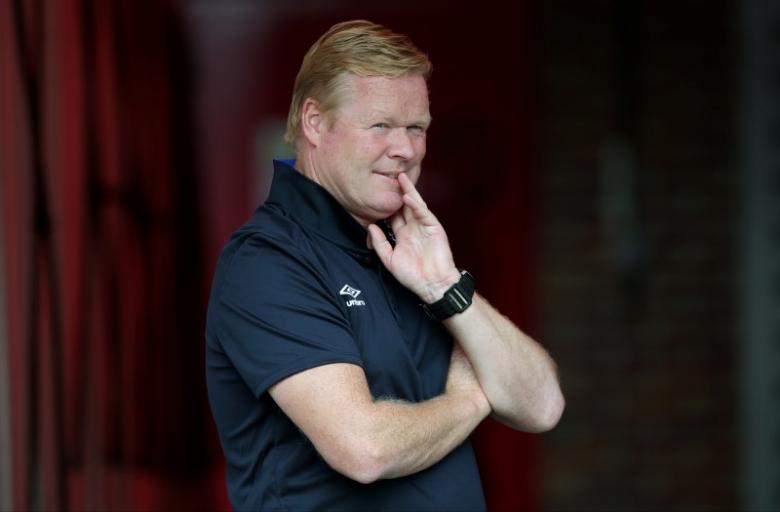Ronald Koeman rolled his eyes when the subject cropped up but Everton’s performance in the Merseyside derby on Monday ensured there was no avoiding a repeat of the question. Namely, will the potential of Ross Barkley morph into the consistent performer David Moyes and Roberto Martínez believed he could be? “I am not sure,” Everton manager’s said. “I am not sure.” The honest appraisal may not sit comfortably with Barkley but represents a fair gauge of the midfielder’s predicament at Goodison Park.
To clarify, in case Koeman’s remarks are seen as another deliberate pop at a player with 18 months remaining on his contract, he was reluctant to discuss Barkley. As is his wont, however, the straight-talking Dutchman did not gloss over the player’s form once the questioning began. His feelings were evident during the derby when the England international shanked a free-kick high into the Gwladys Street stand two minutes before Sadio Mané won the match for Liverpool. Koeman threw his arms in the air in disgust, his frustrations at another fitful contribution from the 23-year-old abundantly clear.
“First of all, I don’t like to say because every word I say about Ross is used by the media in a negative or positive way,” Koeman said when a topic that has dominated his early months in the job reappeared.
“Of course I think the player needs to improve. He needs to improve the tactical aspect of his football, out of his position, he needs to be more clinical and have more creativity in the offensive part of the team but he is working hard on that and trying to get the best out of himself.
“Maybe that type of aggression [Barkley’s dangerous challenge on Jordan Henderson] meant he lost a bit of control in that action but he is working hard. He needs to improve to be the player that maybe everyone expected when he was 18 or 19.”
Can he be the player that everyone expected, Koeman was asked. “I am not sure. I am not sure,” came the reply. Those doubts reflect the general feeling around Goodison about one of their own and are not based on one derby performance featuring poor decision‑making and hesitant reactions. They started during Everton’s two‑season slide under Martínez and have continued during Koeman’s brief time in charge.
Barkley has made 129 Premier League appearances for his boyhood club, scoring 18 goals, and turned 23 at the beginning of the month. He has not only had to adjust to different tactics under Martínez and Koeman but contrasting treatment.
Whereas the Belgium head coach fuelled the hype around Everton’s “diamond” – as the Gwladys Street song goes – by comparing him to Michael Ballack, among others, and occasionally deploying the player out wide, Koeman has taken the opposite approach. From the start of his reign the former Southampton manager has publicly told Barkley he must improve and can no longer be considered a young player, while giving him the midfield positions he favours. Neither manager has managed a consistent return.
Everton’s tendency to go long and direct to Romelu Lukaku this season clearly does not help the man in the No10 role. Equally, in the 4-2-3-1 formation Koeman has favoured, the three behind Lukaku – whoever they may be, and they have been changed frequently – have failed to answer the manager’s call for greater productivity when Everton do control possession.
Barkley, as the club’s big hope, or perhaps because of the unforgiving spotlight on local players, has become the focal point of the debate surrounding Everton’s ambitions rather than developing into the focal point of the team.
“We want the same from him whether we play four against four or five against five – that’s he is shooting, scoring goals and giving assists,” Koeman said. “Now he needs to change sometimes because that action in our half is the same action as what he is doing in the opponent’s half. He can improve with experience, by studying clips, by talking, all these things. He is on a good way but he is still not that player [raises hand] that maybe he can be in the future.
“I had the same stories in Holland with players who, when they were 16 or 17, they were too good in the academy. They didn’t really have competition because they were stronger or they were a better player than the rest. But then they step up a level and everyone is strong, everybody is a good player, and still you need to make a difference – and that is more difficult.”
(The Guardian)
